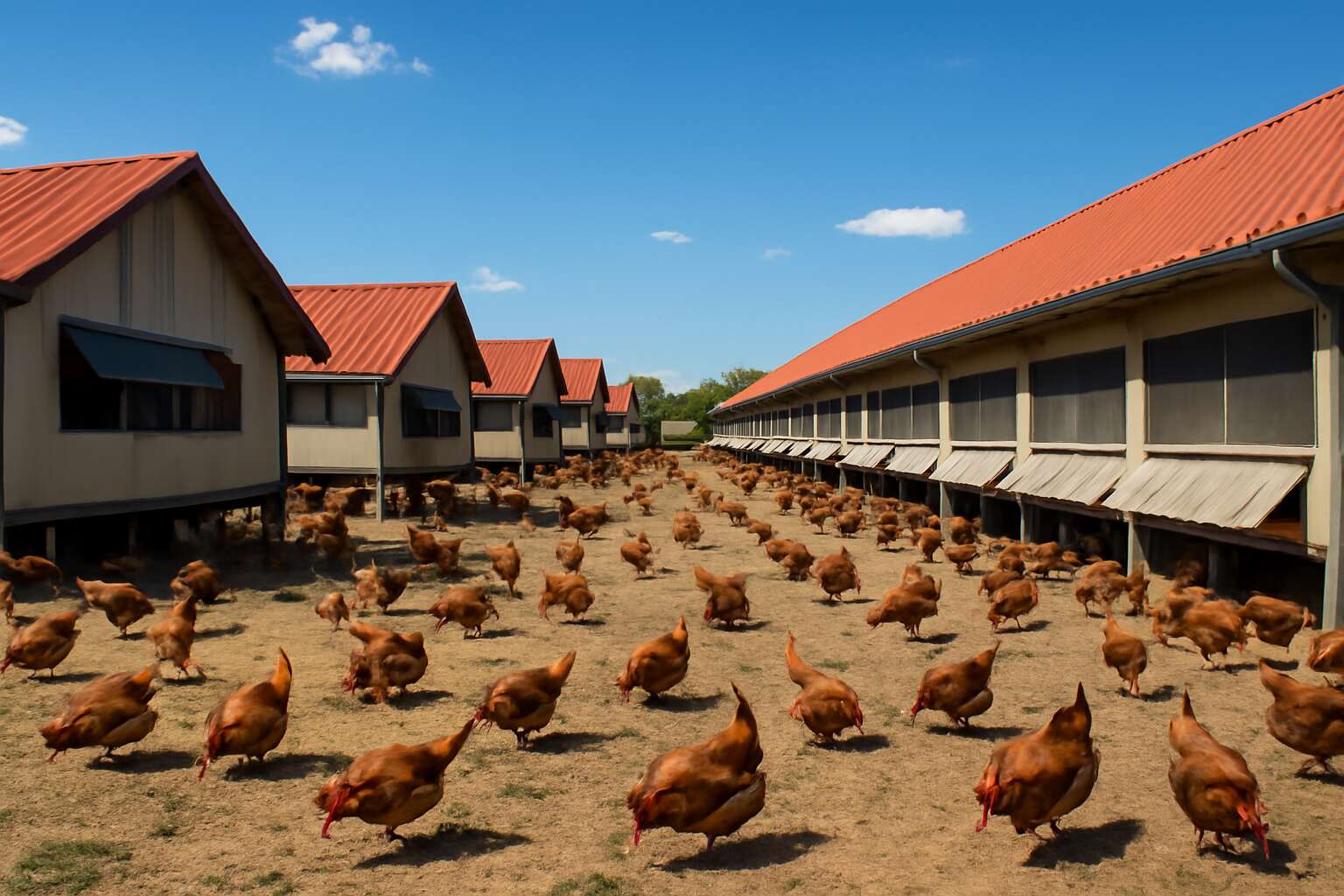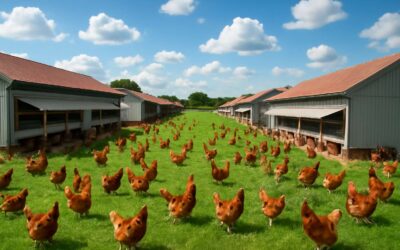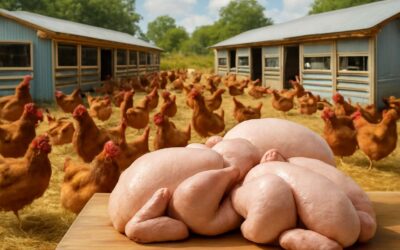Understanding Poultry Farming as a Business
Types of Poultry Farming – Array
In the intricate web of agricultural enterprises, understanding poultry farming as a business reveals a tapestry woven with both tradition and innovation. Poultry farming isn’t merely a livelihood; it’s a dynamic industry that fuels global food security and economic resilience. When questioning, “poultry farm is which type of business,” one embarks on a journey through diverse operational models—each tailored to specific market demands and resource availabilities.
At its core, poultry farming can be categorised into various types, each with distinct characteristics. These include broiler production, aimed at meat, and layer farming, focused on egg generation. Additionally, niche sectors such as organic or free-range poultry are gaining momentum among consumers seeking ethical and sustainable options. Understanding these subdivisions offers invaluable insight into how a poultry farm fits within the broader landscape of agricultural commerce.
To frame the scope further, consider this array of poultry farm types:
- Commercial broiler farms
- Small-scale backyard poultry operations
- Integrated poultry businesses combining hatchery, feed production, and processing
- Specialised organic or free-range poultry farms
Each of these exemplifies a unique business model, illustrating the multifaceted nature of poultry farming. Whether as a primary source of income or a supplementary venture, the question remains—poultry farm is which type of business? The answer hinges on scale, purpose, and market orientation, revealing the profound versatility embedded within this age-old industry.
Business Models in Poultry Industry – Array
Understanding poultry farming as a business involves more than just raising birds; it’s about recognising the diverse models that underpin this vital industry. Each business model reflects different goals, resource levels, and market demands. For example, some farms focus solely on meat production, while others specialise in eggs or ethical, organic products. These distinctions shape how a poultry farm is classified within the broader agricultural landscape.
In fact, the question “poultry farm is which type of business?” can lead to a deeper appreciation of its multifaceted nature. Whether operating on a small scale as a backyard venture or managing a large commercial enterprise, poultry farming adapts to the needs of local communities and global markets. The core of these models is their ability to produce high-quality products efficiently and sustainably, ensuring food security for many households.
- Commercial broiler farms prioritise meat production, often scaling up operations to meet large demand.
- Layer farms focus on egg harvesting, supplying markets with fresh produce daily.
- Integrated poultry businesses combine hatchery, feed production, and processing, creating a seamless supply chain.
Ultimately, the real beauty lies in how adaptable and resilient poultry farming can be—an age-old industry that continues to evolve, driven by innovation and a deep commitment to nourishing communities worldwide. So, when pondering “poultry farm is which type of business,” it’s clear that this industry’s versatility is its greatest strength, offering opportunities for entrepreneurs at every scale and stage of growth.
Economic and Market Aspects of Poultry Business
Market Demand for Poultry Products – Analysis of consumer demand for chicken, eggs, and related products.
The demand for poultry products continues to surge, reflecting evolving consumer preferences and dietary trends. As global populations grow increasingly health-conscious, the consumption of chicken and eggs has become a staple in many households, underpinning the economic resilience of the poultry industry. This persistent market demand underscores that a poultry farm is which type of business—an essential component of the food supply chain with both commercial and socio-economic significance.
In essence, the poultry business operates as a vital link connecting farmers, distributors, and consumers. It caters to a broad demographic, from urban families seeking quick, nutritious meals to international markets importing poultry products. The versatility of poultry farming allows it to adapt swiftly to market fluctuations, making it a resilient and profitable enterprise.
Understanding the consumer demand for chicken, eggs, and related products reveals a complex interplay of cultural preferences, economic factors, and health considerations. This demand influences pricing strategies, production volumes, and investment opportunities, highlighting the critical role of market analysis in shaping successful poultry enterprises. So, when contemplating the question of a poultry farm is which type of business, the answer lies in its capacity to serve as a dynamic, demand-driven industry with profound economic implications.
Revenue Streams in Poultry Business – Sales of live birds, processed meat, eggs, and by-products.
The economic tapestry of a poultry farm is woven with diverse revenue streams, each adding vibrancy to this dynamic enterprise. From the lively trade of selling live birds to the bustling markets, to the more processed avenues like meat and egg production, the financial fabric is rich and multifaceted. The sale of live birds often forms the backbone of income, especially for small-scale farmers, serving as a direct link to local markets and consumers. Simultaneously, processed poultry meat—such as chicken cuts and whole carcasses—caters to a broader commercial sector, ensuring steady cash flow.
Egg production remains a cornerstone of profitability, with the constant demand for fresh eggs sustaining the enterprise’s vitality. By-products, including feathers, offal, and manure, also contribute to the overall revenue, often finding markets in industries like cosmetics, fertiliser, or animal feed.
Understanding these revenue streams illuminates that a poultry farm is which type of business — a multi-faceted, demand-driven industry capable of adapting to economic fluctuations with resilience and ingenuity. This versatility not only sustains livelihoods but also underpins the industry’s vital role within the larger food supply chain.
Cost Factors and Profitability – Initial investment, feed costs, labor, and potential profit margins.
At the heart of any thriving poultry farm is a delicate balance between costs and potential gains. Understanding the economic and market aspects of this industry reveals a complex interplay of factors that can make or break profitability. The initial investment—covering infrastructure, equipment, and stock—can be substantial, yet it lays the foundation for future success. Once operational, feed costs emerge as one of the most significant expenses, often dictating the overall financial health of the enterprise.
Labour costs add another layer of complexity; a well-managed poultry farm requires skilled workers, especially during peak seasons. Profit margins tend to fluctuate based on market demand, feed prices, and operational efficiency. For those asking, “poultry farm is which type of business,” the answer lies in recognising its multifaceted nature—combining elements of agriculture, manufacturing, and retail. It’s a demand-driven enterprise capable of adapting to each economic cycle, showcasing resilience in the face of market volatility.
- Initial investment in infrastructure and stock
- Recurring feed and labour costs
- Market-driven profit margins
Ultimately, the profitability of a poultry farm hinges on strategic management and an acute understanding of these economic factors. This business is more than mere animal husbandry; it’s an intricate dance of economic planning and market insight—an enduring testament to adaptability and resilience in the face of change.
Legal and Regulatory Considerations
Licensing and Permits – Necessary legal requirements for operating a poultry farm.
Legal and regulatory considerations form the backbone of any successful poultry farm. Understanding what licensing and permits are necessary is crucial to ensure compliance with local, regional, and national laws. A poultry farm is which type of business — whether commercial or small-scale — determines specific legal requirements that must be met to operate legitimately.
In most regions, you will need to secure a **business licence** and adhere to health and safety standards that protect both workers and consumers. Environmental regulations are equally vital, especially with regard to waste management and odour control.
To streamline this process, it’s helpful to consider these key legal checkpoints:
- Registering your business with the relevant authorities
- Obtaining permits for waste disposal and water use
- Meeting biosecurity standards to prevent disease outbreaks
- Complying with animal welfare regulations
Understanding these legal and regulatory considerations not only safeguards your investment but also ensures sustainable growth for your poultry farm.
Health and Safety Standards – Regulations on animal welfare, hygiene, and processing.
Operating a poultry farm is more than just raising birds; it’s a complex enterprise subject to rigorous health and safety standards. Ensuring compliance with animal welfare, hygiene, and processing regulations isn’t merely a legal obligation—it’s essential for building consumer trust and safeguarding public health. The question of poultry farm is which type of business — whether small-scale or commercial — influences the specific safety protocols required to operate ethically and legally.
Strict adherence to biosecurity measures and hygiene standards can prevent disease outbreaks that threaten both the health of the flock and the farm’s reputation. Regulatory bodies often mandate detailed procedures for processing and handling poultry products, aimed at reducing contamination risks. For instance, regulations may specify:
- Regular health checks for birds
- Sanitation protocols for equipment and facilities
- Proper disposal of waste and dead birds
Understanding these health and safety standards is vital for anyone pondering the question of poultry farm is which type of business, ensuring sustainability and resilience in a competitive market. The fine line between compliance and oversight can determine the fate of a poultry enterprise, making vigilance a non-negotiable element of operational strategy.
Environmental Regulations – Waste management and pollution control laws.
Running a poultry farm isn’t just about birds and barnyards; it’s a tightly regulated enterprise with serious environmental responsibilities. With the poultry industry generating significant waste, the question of poultry farm is which type of business it truly is becomes even more pertinent. It’s not merely a small-scale hobby—many poultry farms operate at a scale that demands strict waste management and pollution control laws. Failing to comply can lead to hefty fines or, worse, environmental catastrophe.
Environmental regulations typically mandate that poultry farms adopt comprehensive waste management strategies, including:
- Proper disposal of manure and dead birds, avoiding contamination of local waterways
- Installation of pollution control devices to reduce odour and airborne pollutants
- Monitoring and managing runoff to prevent nutrient overload in nearby ecosystems
Understanding these legal responsibilities is essential because the line between a responsible business and an environmental hazard is razor-thin. Whether your poultry farm is a small family operation or a sprawling commercial enterprise, compliance isn’t optional—it’s the bedrock of sustainable and reputable poultry farming. After all, no one wants their farm to be the punchline of an environmental audit or a community protest. So, when pondering the question of poultry farm is which type of business, remember: it’s a business that’s as much about environmental stewardship as it is about eggs and broilers. The regulatory landscape demands vigilance, ensuring that poultry farming remains a model of responsible agriculture rather than a cautionary tale.
Role of Poultry Business within the Agricultural Sector
Integration with Other Farming Activities – How poultry farming complements crop production and other farming practices.
In the intricate tapestry of agricultural enterprise, understanding the role of a poultry farm is which type of business reveals its true significance. Poultry farming is not merely about raising birds; it is a vital cog in the broader agricultural sector, seamlessly integrating with crop production and other farming practices. This symbiotic relationship enhances sustainability, maximises land utilisation, and bolsters economic resilience.
For instance, poultry manure serves as an excellent organic fertiliser, enriching soil health and reducing reliance on chemical inputs. Conversely, crop residues can be utilised as feed or bedding material, creating a closed-loop system that minimises waste. Such integration fosters a diversified farm ecosystem, where poultry farming complements activities like vegetable cultivation or grain harvesting. This interconnected approach not only optimises resource utilisation but also boosts overall farm profitability and environmental stewardship.
Contribution to Food Security – Importance of poultry in supporting local and global food supply chains.
In the grand mosaic of agriculture, poultry farming emerges as a vital thread woven with purpose and promise. The question of poultry farm is which type of business often sparks curiosity, yet its true essence reveals itself as a cornerstone of food security and economic stability. Poultry farming isn’t just about raising birds; it’s a dynamic enterprise that sustains local communities and bolsters global food supply chains. With over 70% of the world’s poultry products consumed domestically, its significance cannot be overstated.
This business acts as a linchpin, supporting staple diets through the consistent availability of eggs and chicken meat. Its nimble adaptability allows it to serve various market demands, from small-scale local markets to large export industries. As an integral part of the broader agricultural ecosystem, poultry farming enhances resilience and promotes diversification. In essence, understanding poultry farm is which type of business underscores its role as a critical pillar in the quest for sustainable food production and robust rural economies.
Conclusion
Understanding what a poultry farm is which type of business can unlock a world of possibilities for aspiring entrepreneurs. It’s not merely a venture into animal husbandry; it’s a complex, dynamic enterprise that intertwines agriculture, commerce, and sustainability. The poultry industry, vital to global food security, operates within a multifaceted framework that demands strategic planning and keen insight.
At its core, a poultry farm is a combination of agricultural practice and commercial enterprise. It involves breeding, raising, and processing birds for meat and eggs—each step a piece of a larger puzzle. The question of “poultry farm is which type of business” often leads to the realisation that it’s a hybrid, straddling the lines between a traditional farm and a manufacturing unit. This layered nature makes it uniquely resilient, yet challenging.
- Production and supply chain management
- Animal husbandry and welfare
- Market positioning and consumer demand
In essence, a poultry farm is a business that demands both scientific precision and entrepreneurial agility. Recognising its multifaceted identity allows stakeholders to navigate its intricacies with confidence—an essential step in mastering the art of poultry farming. The answer to “poultry farm is which type of business” isn’t simply one label but a complex tapestry woven with industry insights and strategic foresight.




0 Comments